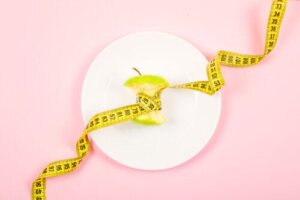The 1000 Calorie Diet: Does it Really Work?


Written and verified by the nutritionist Maria Patricia Pinero Corredor
When we consider going on a 1000 calorie diet, our main intention is that we’re going to lose weight fast. And, of course, this is true, but is it really beneficial to lose weight in such a short period of time?
How could it affect my health? First of all, if you decide to practice it, it should be under the supervision of an expert.
Each body responds to individual metabolic needs in a different way. When putting together a weight loss plan, the ideal thing is to ensure the consumption of all the nutrients that maintain a good state of general health.
The 1000 calorie diet is hypocaloric to the extreme, but wins followers for its rapid effectiveness in losing weight. So, we invite you to continue reading this article to see whether it really works or not.
What are restrictive diets?
As obesity is currently a major public health problem in the world, many ways to lose weight have been proposed. One of them is to eat restrictively, limiting foods in the diet.
A restrictive diet uses the equation of eating far fewer calories than the body uses during the day, with the goal of losing weight. This promises rapid weight loss.
Within this group are hypocaloric diets, which range from 800 to 1500 calories per day; and very low calorie diets, which range from 450 to 800 calories per day. The 1000 calories a day diet is in the first group.
In addition, the Revista Argentina de Endocrinología y Metabolismo states that weight loss in these diets is mostly body water and muscle mass. There’s no impact on fat percentage, so adverse effects may occur.

Find out more here: The Reverse Dieting Myth
What foods are part of the 1000 calorie diet?
When performing this diet, calories should be measured. It isn’t recommended to include sweets or alcoholic beverages and meals shouldn’t be substituted. Due to its restrictive nature, only people with a high body mass index should follow it.
Furthermore, it can’t be prolonged over time, as it causes significant adverse effects. An expert in these diets should plan and follow up the program.
The main suggestions for this diet are the following:
- Only include 3% of calories from fat and less than 300 milligrams of cholesterol.
- Eat 5 servings of fruits or vegetables for their low caloric content, high fiber value and sufficient water. Both water and fiber give satiety power.
- Limit the consumption of carbohydrates. In particular, refined flours and their by-products, such as bread.
- Consumption of white fish, poultry, and lean meats is encouraged.
- Lunch should include vegetables, proteins, low fat, and only small portions of legumes.
- It’s recommended to drink 1.5 to 2 liters of water per day.
- Canned foods can be used, as long as they are packed in their natural state. The same applies to frozen foods.
- Artificial sweeteners are allowed.
- It’s advisable to eat 5 meals a day and to vary foods within the same group.
- Prepare steamed, baked, microwaved, or cooked food with sufficient water, limiting the use of oil.
Does the 1000 calorie diet really work?
When practicing the 1000 calorie a day diet there are more disadvantages than advantages. We’ll explain them below.
You lose weight quickly
Looking at the main goal of the diet, which is to lose weight, this is achieved in a very fast way. However, this loss has its disadvantages, since it doesn’t act directly on the accumulated body fat. In addition to this, any slight variations to the diet can cause the lost weight to be gained again.
That is why, when practicing the 1000 calories a day diet, daily exercise is required in order to burn the accumulated fat, thus reducing the volume. To do it in a controlled way, you can lose 1 to 2 kilos per week, but everything will depend on your metabolism.
It produces a rebound effect
There’s no doubt that the body responds to low-calorie diets. It’s quite normal to lose weight when practicing it.
However, once you go back to your usual diet, you’ll gain weight again. You’ll usually gain all the weight you lost or even more.
In addition, it increases food cravings and the tendency to accumulate fat in different parts of the body. This response of the body to the recovery of the intake is known as the rebound effect.
A deficit of nutrients could occur
Food restriction generates a deficit of nutrients necessary for the body. That’s why, when practicing this type of diet, symptoms such as dizziness, fatigue, tiredness, and weakness may occur, which will prevent you from being able to carry out your daily activities.
If the 1000 calorie diet is maintained for a long time, this will lead to health problems. This includes alteration in the intestinal microbiota.
More information on diets here: The ProLon Diet: What Is It and What Are Its Benefits and Disadvantages?
It increases the risk of eating disorders
Several experts admit that restrictive diets achieve rapid weight loss, but they clarify that they’re among the most significant precursors of eating disorders.
In addition to the risks of binge eating and other disorders, it’s also possible to ingest more empty calories, that is, foods with a lot of energy, but with few nutrients.
Alters metabolism
By reducing some nutrients, metabolism can be uncontrolled. For example, when carbohydrates and fats are limited, metabolic activity changes. This is how the functions of vital organs are altered.
Some metabolic disorders that can occur are as follows:
- Diabetes type 2
- Dyslipidemia
- Hyper or hypothyroidism
- Loss of muscle mass or sarcopenia
- Hepatopathies
It could cause constipation
When restricting caloric intake to 1000 calories, the most limited foods are those vegetable sources of starches, such as cereals and legumes. These also carry dietary fiber, so their total intake would be affected. Constipation may occur. In addition, the power of satiety would also be diminished.

Episodes of hypoglycemia may appear
When depriving oneself of certain types or portions of food, the possibility of developing hypoglycemia, or low levels of sugar, in the blood increases. In addition, the body’s cells don’t get the fuel needed to lead the usual lifestyle. In the case of some associated diseases, the body can become unbalanced.
The immune system can be affected
Changes in the 1000-calorie diet and restrictions in nutrient intake can affect immune health. Those on extreme diets would have more infections.
For example, vitamin C is involved in the body’s defense function. Recently, the importance of this vitamin in reducing the incidence of infectious diseases of the respiratory tract was assessed.
Is the 1000 calorie diet safe?
A safe route to weight loss includes counseling with a nutrition expert. Caloric intake should be adjusted to a pattern that meets individual needs.
The fastest way to get there is not always the best way.
The best way to lose weight in a healthy way and maintain it over time is by a caloric deficit through an intake that is below what we spend daily. However, this should always occur within logical and safe parameters.
A change in your lifestyle, incorporating physical activity, will help you safely reach your desired weight. In this way, you’ll avoid exposing yourself to the risk of contracting certain diseases.
All cited sources were thoroughly reviewed by our team to ensure their quality, reliability, currency, and validity. The bibliography of this article was considered reliable and of academic or scientific accuracy.
- Francisco Javier Vilchez López , Cristina Campos Martín, María José Amaya García, Pilar Sánchez Vera y José Luis Pereira Cunill. Las dietas de muy bajo valor calórico (DMBVC) en el manejo clínico de la obesidad mórbida. Nutr Hosp. 2013;28(2):275-285. Disponible en: https://scielo.isciii.es/pdf/nh/v28n2/03revision02.pdf
- Andrew Warrilow , Duane Mellor , Andrew McKune, Kate Pumpa. Dietary fat, fibre, satiation, and satiety-a systematic review of acute studies. Eur J Clin Nutr. 2019 Mar;73(3):333-344. doi: 10.1038/s41430-018-0295-7. Epub 2018 Aug 30.
- Giuseppe Cerullo , Massimo Negro, Mauro Parimbelli , Michela Pecoraro, Simone Perna, Giorgio Liguori, Mariangela Rondanelli, Hellas Cena, Giuseppe D’Antona . The Long History of Vitamin C: From Prevention of the Common Cold to Potential Aid in the Treatment of COVID-19. Front Immunol. 2020 Oct 28;11:574029. doi: 10.3389/fimmu.2020.574029. eCollection 2020.
- MEJÍA MG , VERONESI LA ; MALDONADO AL , FUENTES RH. Dietas restrictivas ¿realmente son lo que prometen? REV ARGENT ENDOCRINOL METAB. 2021; 58 #2. Disponible en: http://www.raem.org.ar/numeros/2021-vol58/numero-02/raem-58-2-37-45.pdf
- Reyna Cruz, María Ávila, María Cortés, Rosalía Vásquez, Juan Mancilla. Restricción alimentaria y conductas de riesgo de trastornos alimentarios en estudiantes de nutrición. Psicología y Salud. 2008, 18,002, pp. 189-198. Disponible en: https://www.redalyc.org/pdf/291/29118205.pdf
This text is provided for informational purposes only and does not replace consultation with a professional. If in doubt, consult your specialist.








